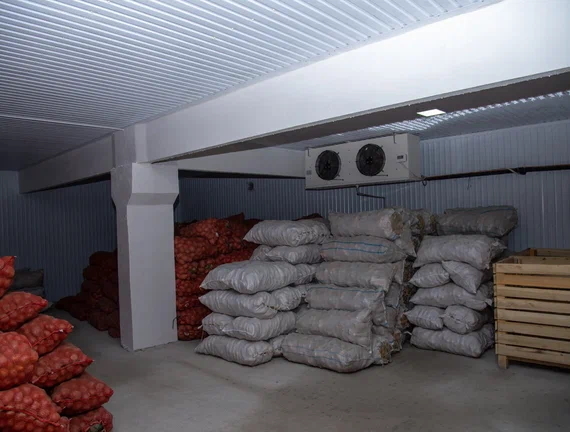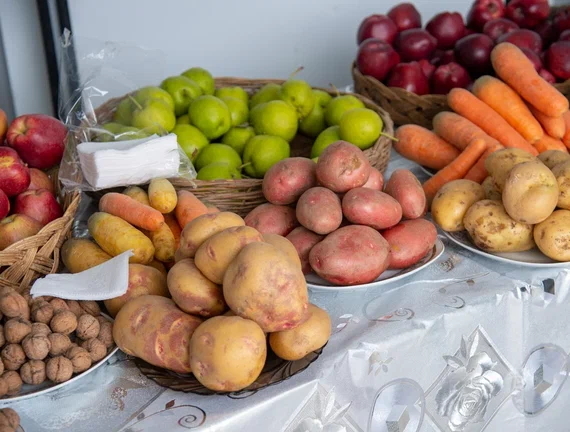What is the purpose of PLC?
Local farmers' products are rarely being used in meals for primary school children these days. However, they have a lot to offer! Vegetables and other crops bought from a local producer will arrive faster to the end consumer than wholesale lots of potatoes, for example, transported from afar. Therefore, they will be healthier for the schoolchildren and taste better.
However, it is more difficult for local farmers to be a part of school meals: firstly, they almost never participate in public tenders for food supplies to schools. Secondly, both schools and small producers have no place to store big amounts of food. Nevertheless, these problems can be solved by building a bridge between the consumer (schools) and the producer (farmers).
This "bridge" will be the production and logistics center, facility for storing and processing food that goes to schoolchildren. The center will purchase the food required by the school canteens from local farmers and monitor its quality through the District center for Disease Prevention and State Sanitary and Epidemiological Surveillance (DCDP&SSES). The PLC itself will be able to participate in public tenders for the supply of food for school meals and most likely win them.
Moreover, vegetables will be washed, cleaned, sliced, packed and frozen at the center to reduce the preparation time of hot meals for children in primary school canteens. Special vehicles will deliver the vegetable soup kits to schools. In turn, mobile laboratories will enable the DCDP&SSES staff to check the quality of food brought to school canteens by students’ parents in grades from 1 to 4 as a contribution to their children's meals.
The construction of the center started six months ago. This autumn, experts evaluated whether the center was ready for the opening.
What did the examination show
A monitoring seminar was held in Kadamjay in October. The event was attended by SIFI's economic and financial advisor Anatoly Maximov, WFP staff from Kadamjay office, the representatives from the district administration and local education department, the head of the “Bii Kok” cooperative, representatives from DCDP&SSES and the school directors. The participants gave presentations on the project and then visited the premises of the center.
The audit results were successful, namely:
- The Kadamjay administration has secured an area for the “Bii Kok” cooperative that will be used for potatoes and vegetables intended for school feeding. Moreover, the municipal staff is willing to expand the cultivated area for farmers to produce agricultural products for school meals.
- The cooperative has renovated the storage rooms for vegetables and set aside vegetables for the primary school students for the second half of the year. PLC already storages enough quantities of potatoes, onions, carrots and peppers.
- The next stage of the technical preparation of the project should be providing the equipment for the processing unit, the freezer room, as well as an isothermal car (allowing to maintain a certain temperature) and a mobile laboratory for checking the quality of products. WFP has already run a tender to select a supplier. It is planned to deliver the necessary equipment to the site within 1.5-2 months.

Who will coordinate the work of the center
A certain part of the seminar agenda was dedicated to a discussion of the regulations for the Coordinating Committee. This body will consist of representatives of all stakeholders involved in the project implementation. The committee will be elected for five years and will be able to monitor the use of the equipment purchased according to the needs of the center, as well as address a wide range of issues between suppliers of products and end consumers - schools, kindergartens and, possibly, when expanding the Programme, other social facilities of the Kadamjay district.

What are the outcomes?
After the full-scale launch of the PLC, schools in the Kadamjay district will be able to use local produce, especially vegetables and potatoes, for school feeding. Schoolchildren will receive a high-quality, balanced meals. The inclusion of seasonal crops in the daily rations will improve the quality and nutritional value of school meals.
On the other hand, involving local farmers in school feeding will help them to expand the market for their products, allow for better planning of volumes and variety, and reduce the transportation costs. Consequently, it will lead to an increase in income.
Jobs will be created in the district and as a result, tax revenues will increase. As for the costs of purchasing seeds and vegetables for schools, thanks to the project it will be possible to reduce those. It is predicted to reduce the costs by 10-15%.
We are looking forward to the spring of 2023, when the Kadamjay Production and Logistics center will be officially opened. And, of course, we wish the project a successful start!
